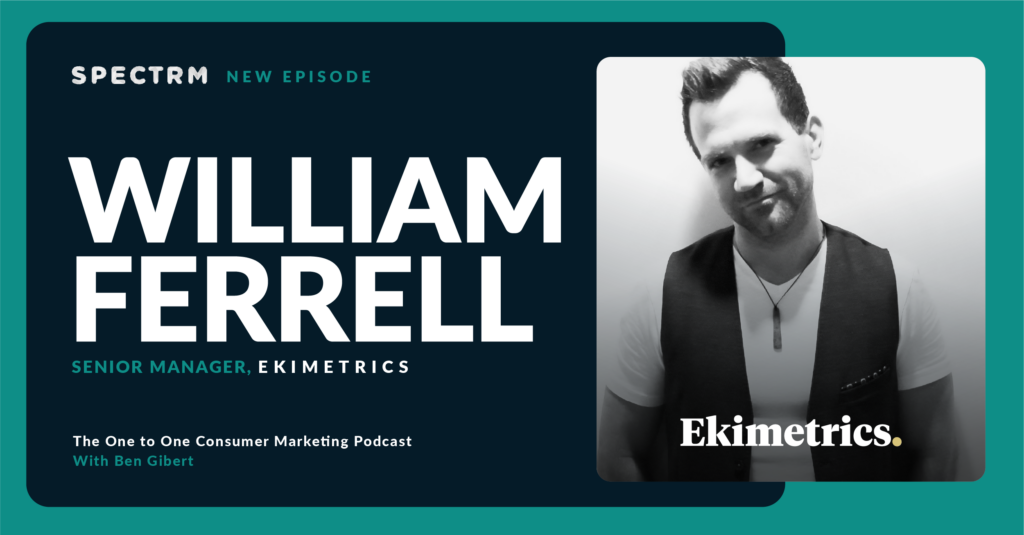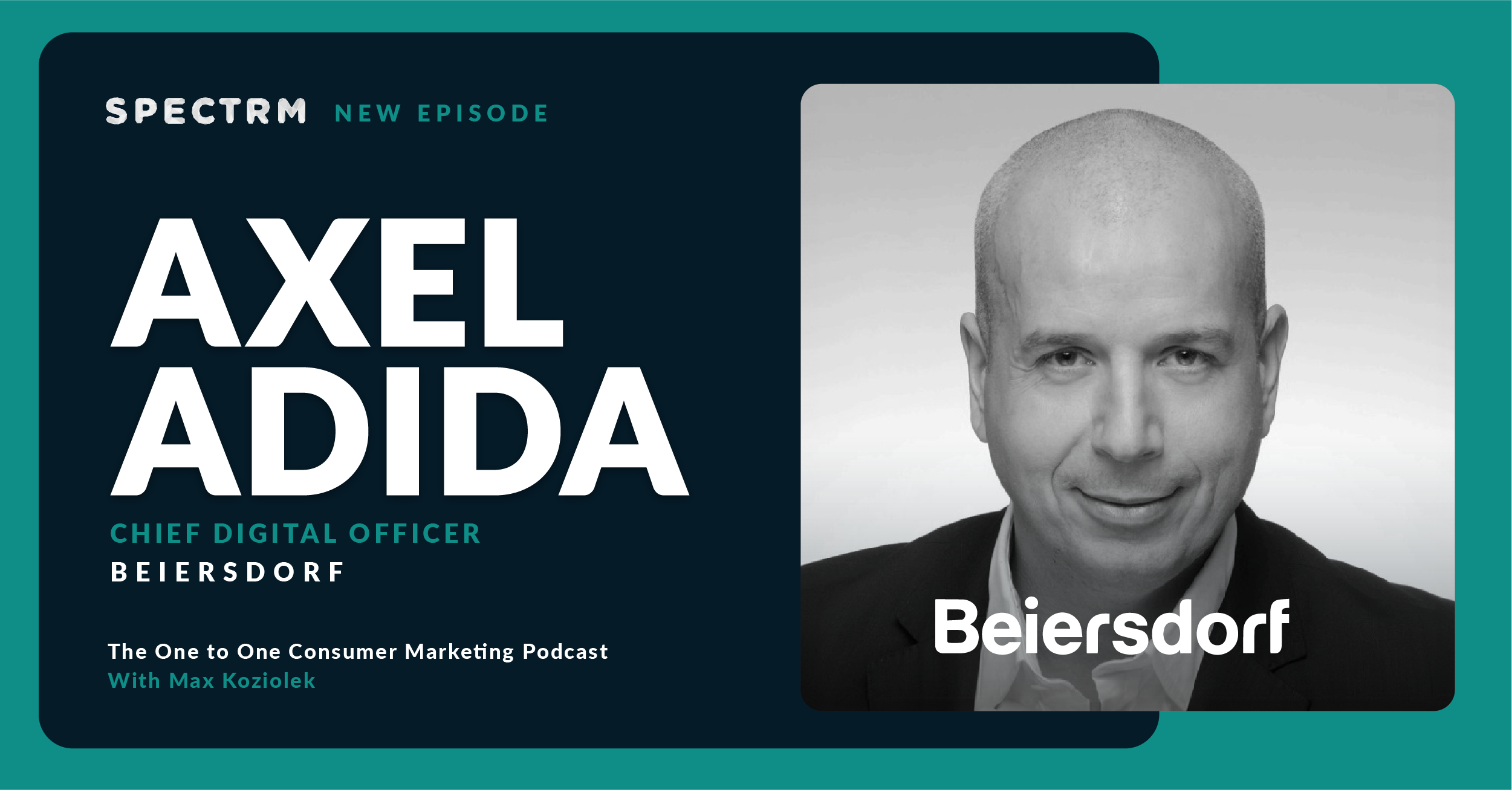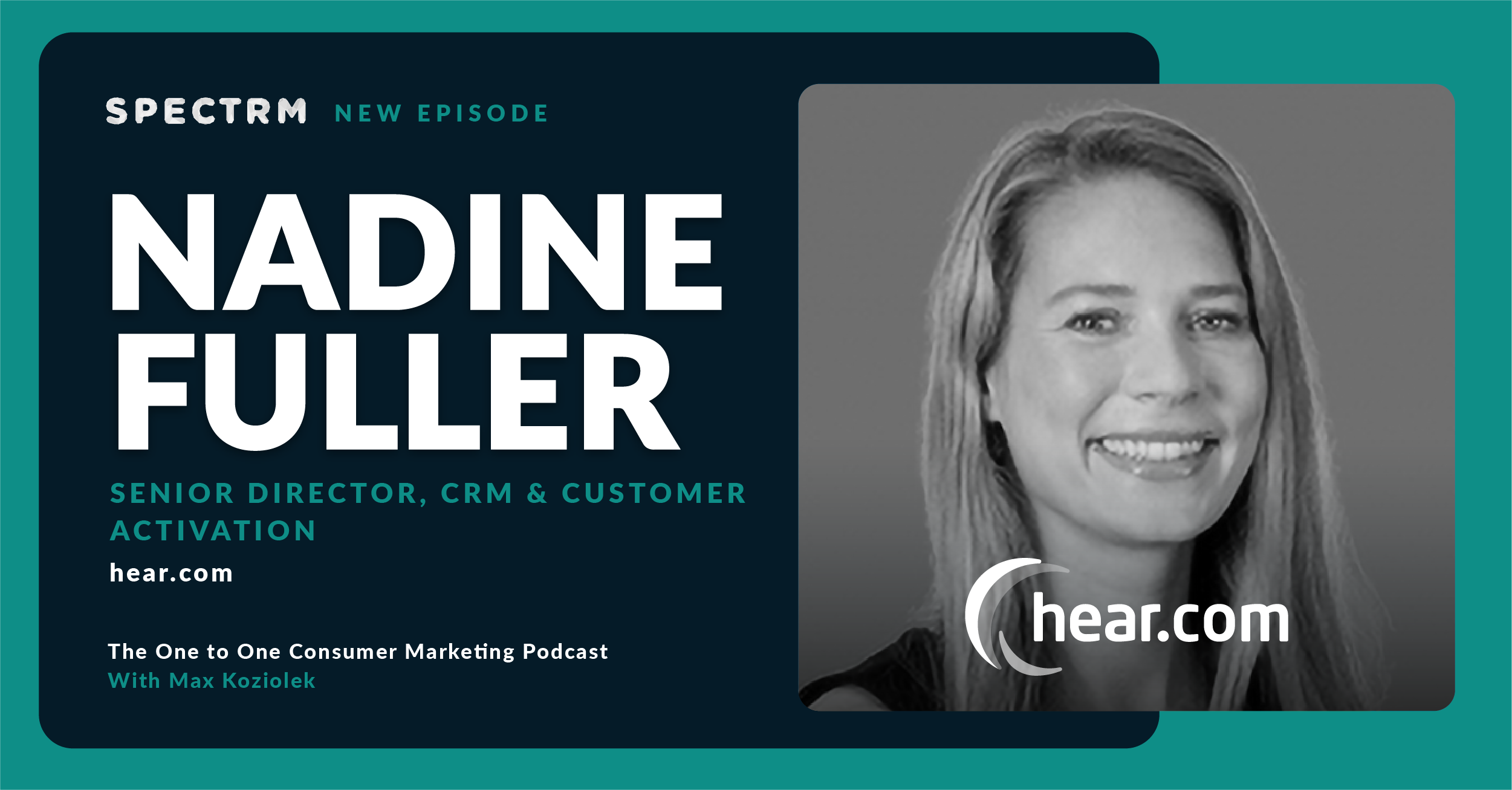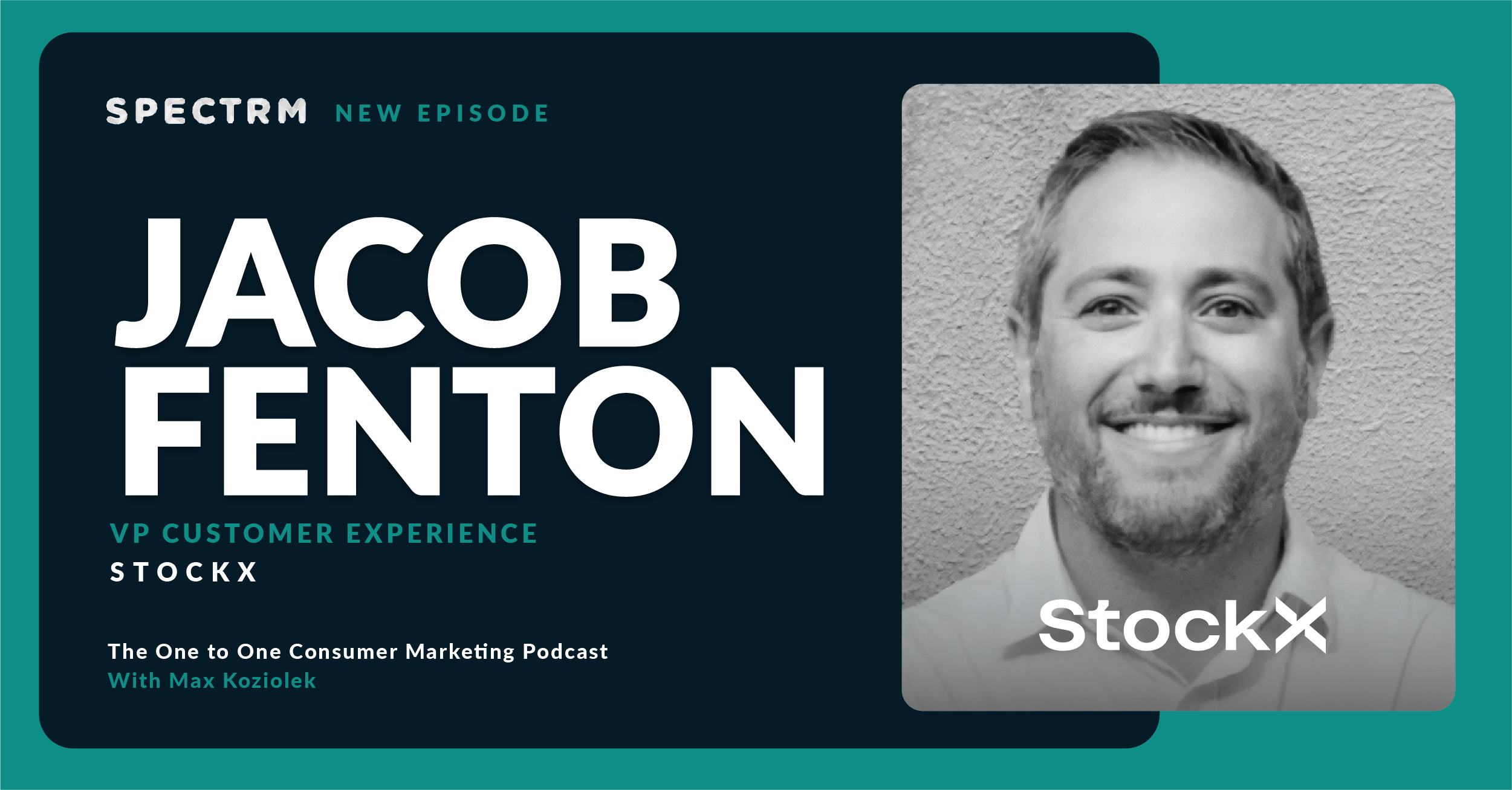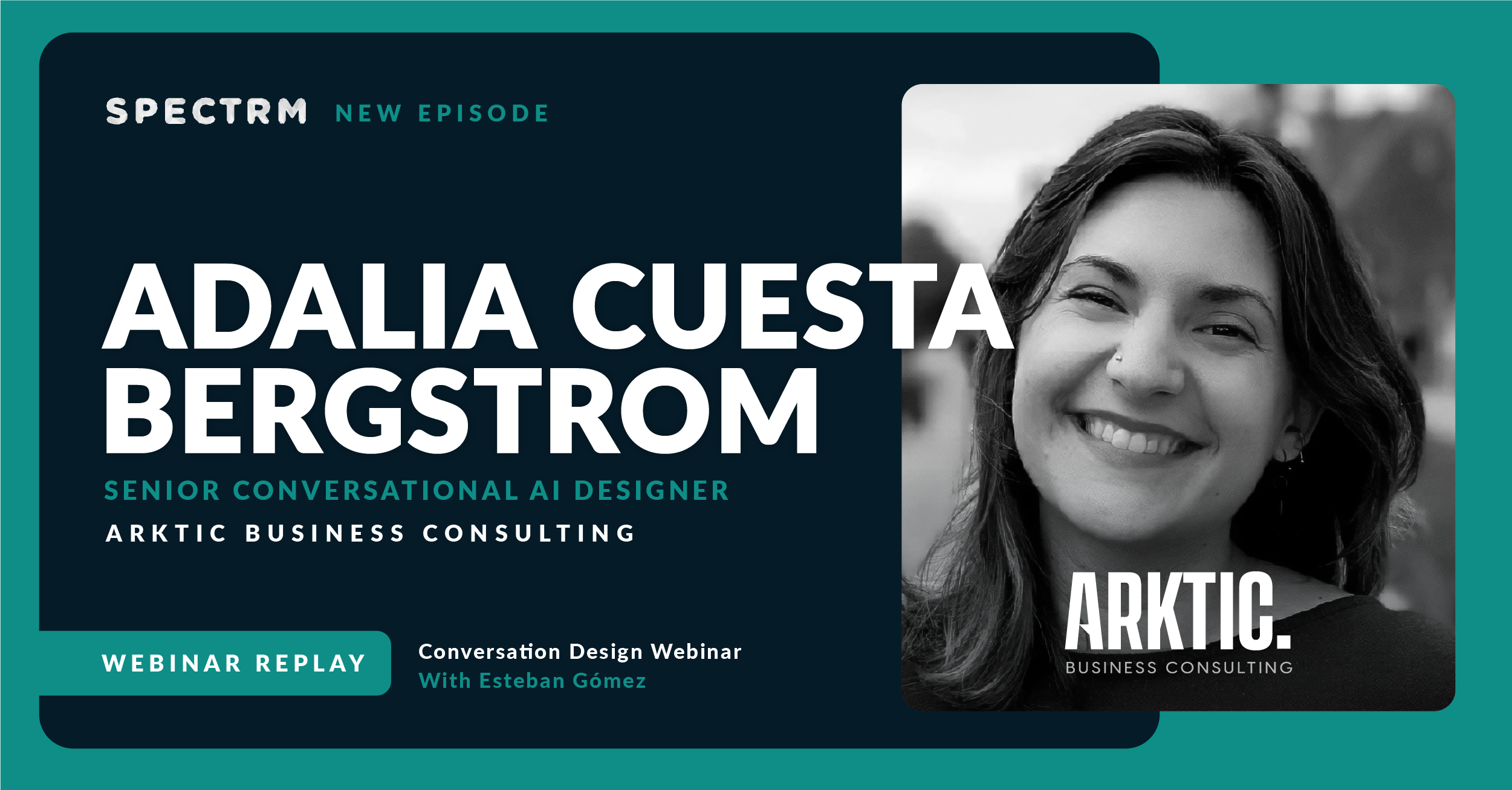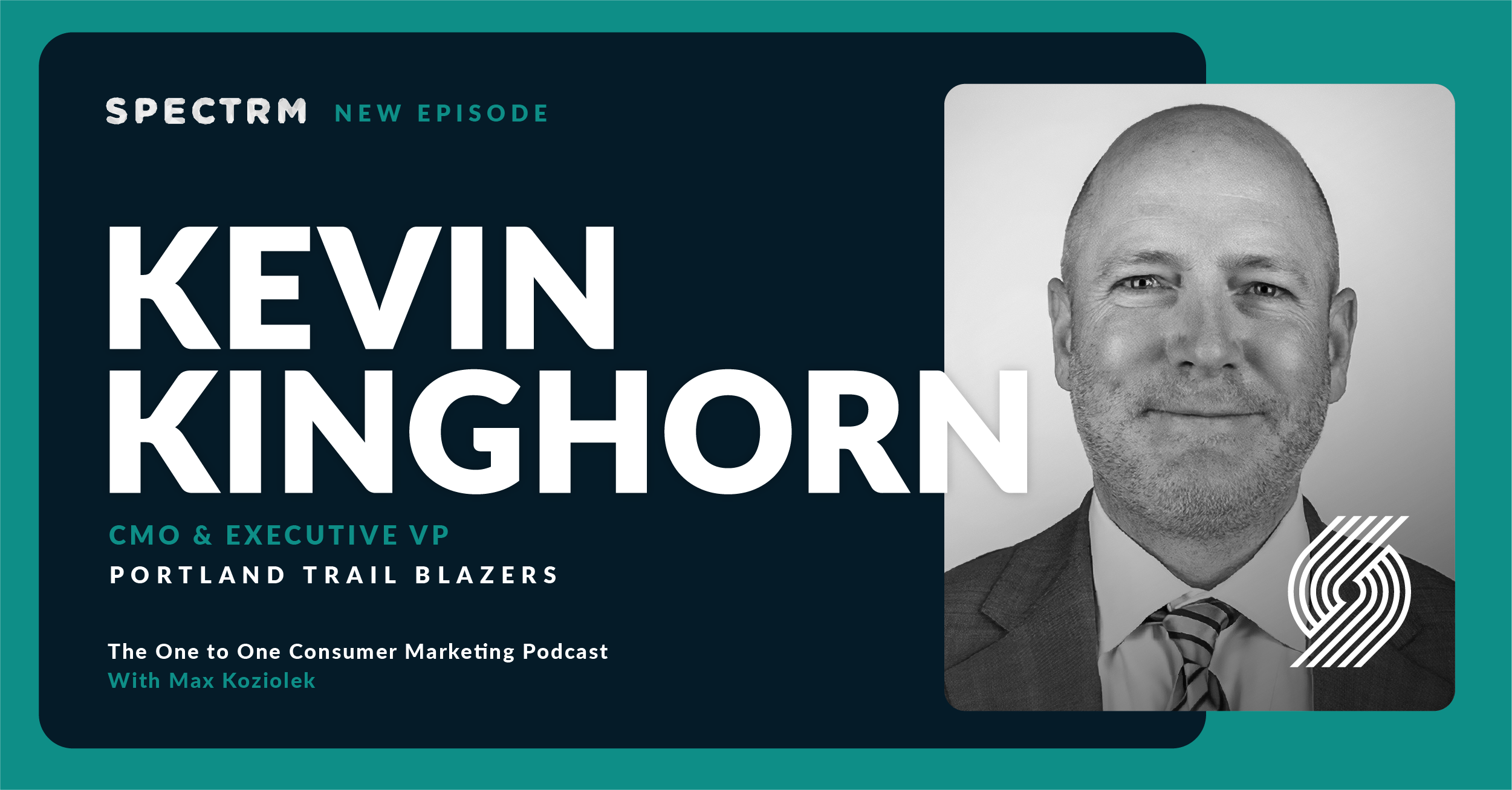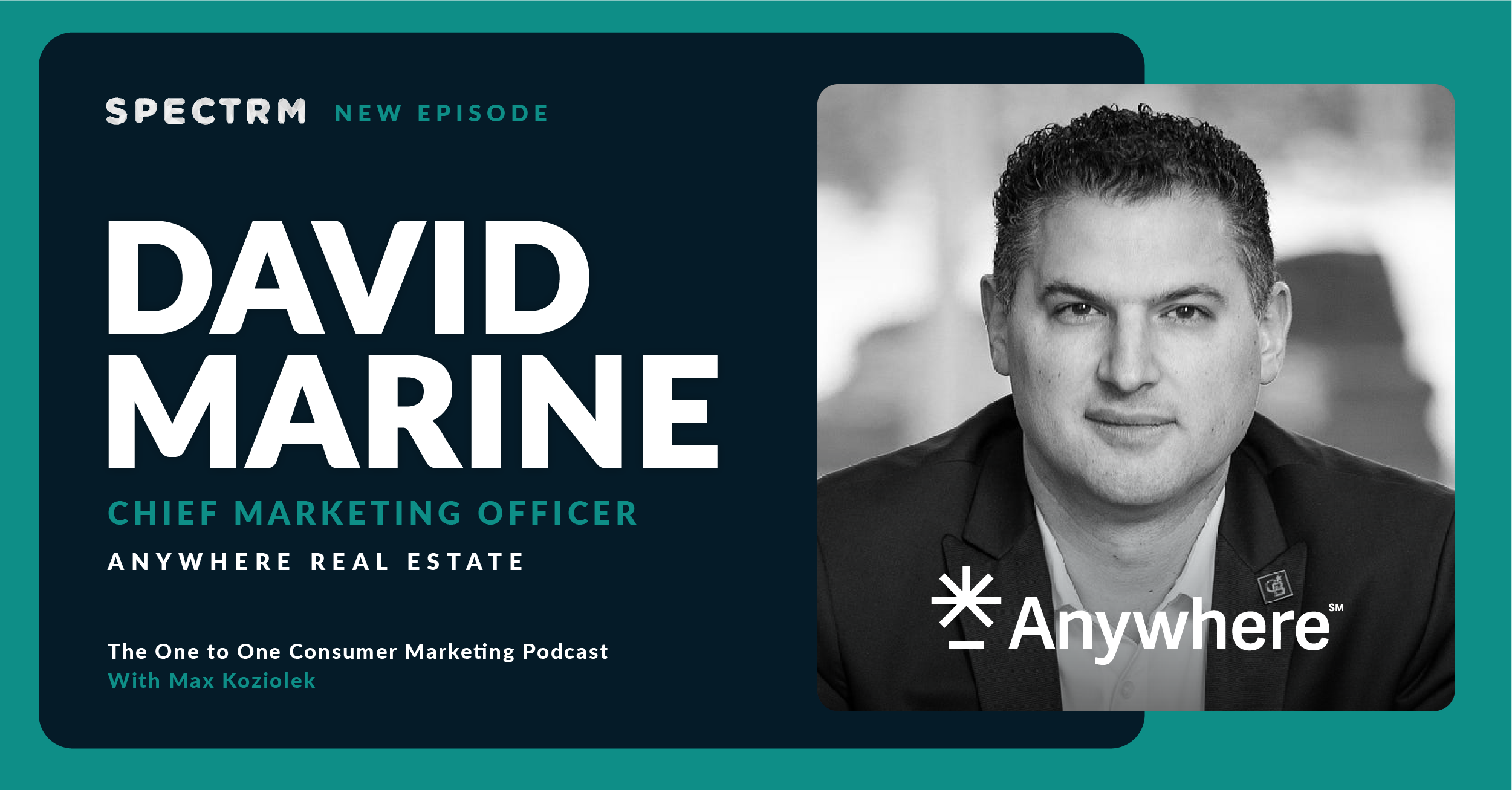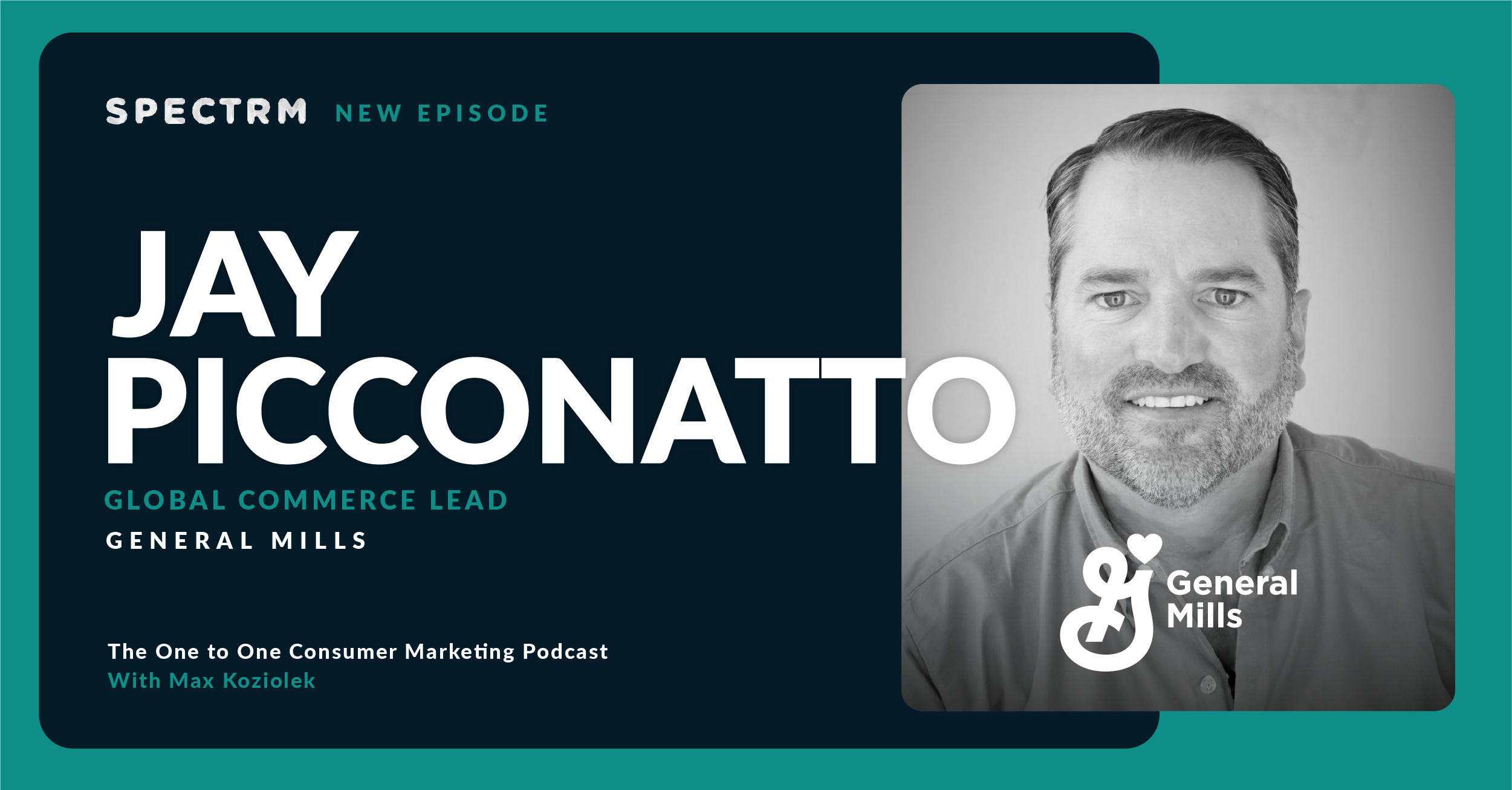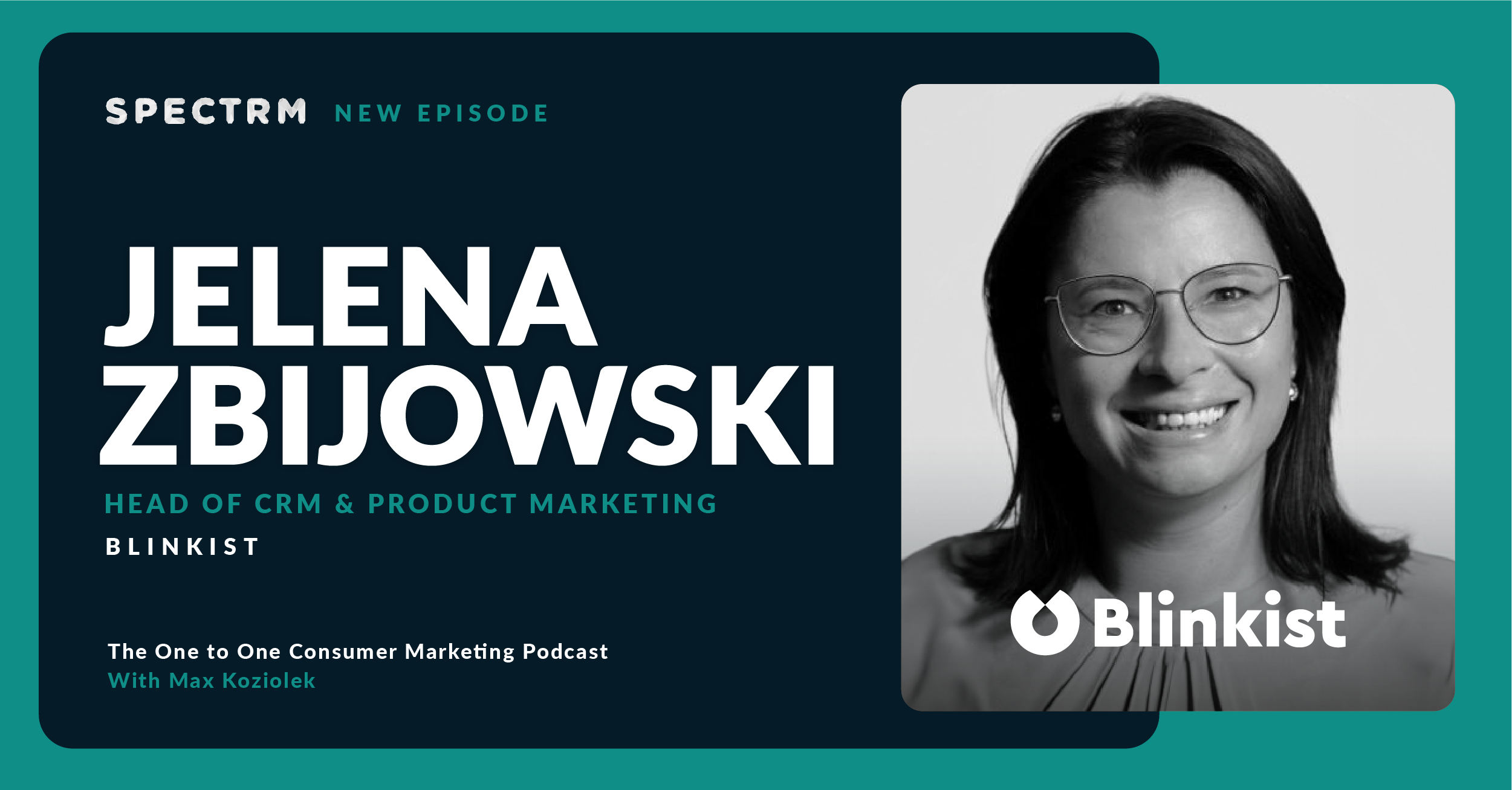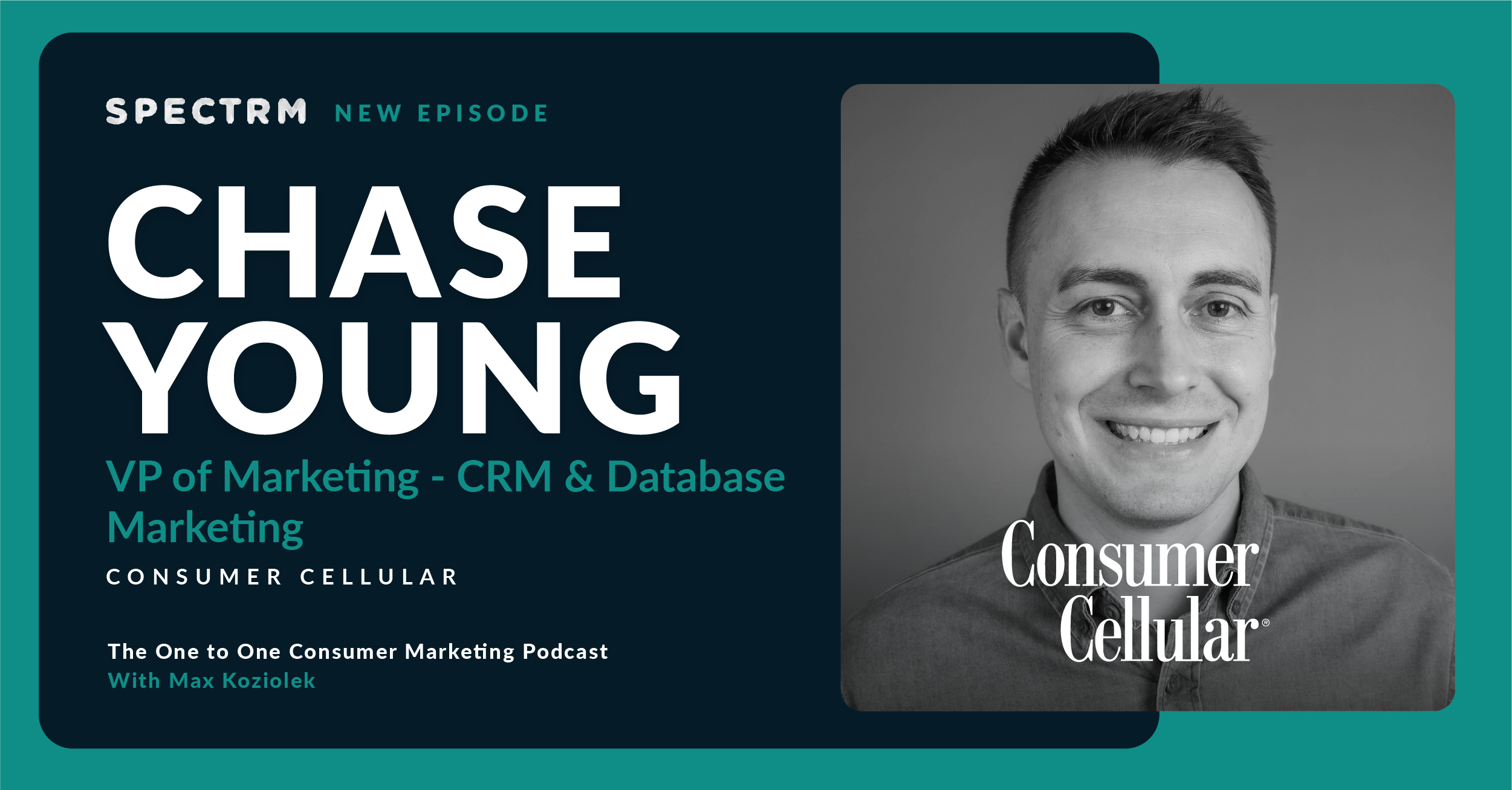Summary
Ben speaks with William Ferrell, Senior Manager at Ekimetrics, a leader in data science and AI-powered solutions. They discuss why brands are losing millions by not getting to know their audience and serving up ads that aren’t relevant, the three things a brand needs for personalization at scale, and why brands should turn to data and connected tech stacks to improve their efforts. They also talk about Colgate’s successful Facebook Messenger campaign, the different challenges to customer retention between low engagement and luxury brands, and why the future of marketing will be data-driven.
Topics discussed
- The current state of consumer marketing, and why companies are wasting millions of dollars serving up ads that aren’t relevant to their customers because they’re not getting to know them deeply — despite having the tools to do so.
- The challenges to customer retention and loyalty, especially with a low engagement product like toothpaste, and why they made the shift to focusing on building relationships through value exchange.
- How Colgate launched a “whitening at home” campaign through Facebook Messenger, which engaged customers through chat and gamified their experiences, resulting in 70-80% engagement rates.
- The different approaches to customer engagement between toothpaste and luxury brands, and how despite the in-person focus with luxury, there’s opportunity to use data to drive a better experience.
- The three pillars of personalization — audience, technology, creative — and why you need these three things to be able to scale.
- Three pieces of advice for marketers, including why you should walk in your customers’ shoes, why you should focus on getting the audience right first, and why you need to create utility to stand out.
- How the future of marketing will continue the digital transformations that happened during COVID, and why data-driven will become business as usual.
Personalization is three things. It starts with the audience, which is backed by data. And then that's underpinned by the technology that helps us serve all the personalized creative, and then also the creative is that third part. You have to have the right agencies, the right creative people to help you with that. If you don't have those three things— again, audience, technology, creative — then you can't do personalization, you can't do it at scale at all.
Guest biography

- 18 years proven expertise in developing brands through innovative digital consumer marketing initiatives. Dynamic solution strategist with global business acumen, adept at implementing integrated marketing solutions from concept to actualization. Extensive experience in developing strategic planning and award-winning innovative digital solutions that improve business growth and efficiency.
- Track record in achieving quantifiable results, empowering marketing teams, launching digital solutions and services, and generating significant consumer value. Team builder with in-depth understanding of business models to raise an organization’s digital visibility. Proficient in all phases of budgeting and digital campaign strategy. Leveraged analytic techniques, intelligence, innovation, and critical thinking skills to produce effective results.
Company overview
Ekimetrics is a pioneering leader in data science and AI-powered solutions for sustainable business performance. We help companies get more from their data and implement pre-packaged AI solutions, so they can combine high impact with long-term business purpose.
Industry: technology, information and media | www.ekimetrics.com
Subscribe to the podcast newsletter
Transcript
00:00
Intro
Personalization is three things. I guess it starts with the audience, again, like we’ve mentioned, which is backed by data, surprisingly, and then that’s underpinned by the technology that helps us serve all the personalized creative. And then also the creative is that third part. You have to have the right agencies, the right creative people to help you with that. And if you don’t have those three things, again, audience, technology, creative, then you can’t do personalization, you can’t do it at scale at all.
00:33
Ben Gibert
Hey everyone, and thanks for listening to and watching the one to one consumer marketing podcast. Today I’m speaking with Wil Ferrell at Echimetrics leader in data, science and AIpowered solutions for sustainable business performance. William, thanks for chatting with me today.
00:49
Wil Ferrell
No, for sure, thanks for having me. Really appreciate it. Looking forward to having a back and forth here, seeing how it goes.
00:56
Ben Gibert
Yeah, I’m looking forward to our conversation, too. Before we get started, can you tell our listeners a little bit more about yourself, your background, and then how you ended up at your current role?
01:04
Wil Ferrell
Sure. I don’t want to go too far back, but I guess I’ve had a pretty long career, I guess about 18 years, and it’s all really been focused on data. I started out in the CRM direct mail kind of database marketing type world. It was like a small little consultancy where we used data from different clients to really better understand what was going on with them, more or less. So we could build different types of models, conversion models, response models, so we could manage different types of messages and creatives across things like CRM, email, direct mail, a lot of stuff that we’re going to be talking about today. So it was really based on statistical analysis, building these types of models to identify the specific types of consumer traits that were indicative of certain actions, I guess you could say from there kind of got into the agency world.
01:52
Wil Ferrell
Because what I saw was that everything I was doing in direct marketing was soon going to be done within the digital world. So I was working at Starcom for about six years across different markets there, different roles. Most recently, before Echimetrics, I was actually at Colgate, Palm, Olive for the last couple of years, leading the digital transformation across 15 markets in Asia Pacific. And I would say my main goal while I was at Colgate was really to bring all of our digital channels, all of our digital media, the digital touch points, bring that all together so consumers would have that singular experience with the brand. And then now at Echimetrics, I’m actually able to bring that to all of our clients where we work with a lot of luxury brands as well, people like Chanel, Bjor, L’Oreal, but also other insurance companies like AXA and Haleon and CPG.
02:43
Wil Ferrell
So it’s actually been really interesting because even though where from my career started and where it is now. And then also, even though this whole digital world, we’re, like, almost 20, I would say probably almost 30 years into it, brands still need a lot of guidance on how to really best stand out. So it’s really exciting to keep on moving down that path.
03:05
Ben Gibert
Yeah, absolutely. And I think when you say brands need to stand out, I think that’s never been more true. When you think about sheer volume of competition. And, like, you started this with saying it’s all about the data, because when you think about CRM, I think that’s always the starting point, right? Like, unifying that identity of the customer, all the data points, like understanding what their journey is. I’m sure you’ve been through some very interesting transformations when it comes to digital, and maybe that speaks a little bit to how you think about the current state of consumer marketing today. But can you talk to that a little bit? Like, how do you feel the landscape looks like?
03:43
Wil Ferrell
Yeah, for sure. And just so your viewers know, we’re probably going to be talking a lot about data today. That’s kind of the crux of my career, I guess. So everything I do is kind of looked down in that data mindset, I guess. But with where marketing is today, actually just kind of what you said, I think today consumers are just inundated with ads, and most of these ads are not really relevant to what they need, especially within the digital world, too. That being said, I think with digital, it’s more about performance to some extent, but I think there needs to be a balance between digital performance marketing and brand marketing as well. But what I kind of bring this back to is when it comes to the state of where marketing is right now, is because everyone gets all these ads, and they’re not relevant to them.
04:29
Wil Ferrell
And the reason to me, they’re not relevant to them is because a lot of companies and brands aren’t really paying attention to audiences. So what I was really trying to do across my career, most recently at Colgate, is really focus on the audience, because everything starts with your audience. And I think a lot of brands focus too much on the creative and the pretty pictures rather than who they’re actually speaking to. I actually see on YouTube every day that I’m on YouTube, I get ads in Cantonese for things that have nothing to do with me. There’s nothing about my browsing history that says I speak Cantonese or I would be interested in these products. I don’t even know what these products are, honestly. But it’s just crazy that companies are out there wasting millions of dollars because they aren’t spending enough time on this kind of stuff.
05:14
Wil Ferrell
And the technology is out there as well. Google, Facebook, all these guys, they have technology out there to be able to target your audience and do it very precisely. So I think, honestly, that’s where a lot of companies need to start spending a lot more time. And that could really help. I think that would help the current state of marketing where it is today. Because what we really need is for brands to start using all of these digital data points to really understand who their customers are. And honestly, data is your friend. Data is a marketer’s friend, I think. And it’s something that marketers, I think, really need to spend more time on.
05:53
Ben Gibert
Yeah, absolutely. For context, for the listeners, will is based in Hong Kong, which is why he’s getting poorly served ads in Cantonese. Obviously, he does not speak Cantonese. I think that’s a great example of acting on the wrong data points, too. Right. You could add that additional layer of language targeting that would make that mess go away. But I think you touched on some really important things there, right. The importance of audiences in terms of really getting in front of the right person, like, how do you segment your audience? You could target anyone. You could target the entire market. Ultimately, you try to narrow that down. And I think particularly in the context of CRM, right. Once your audience lives in your CRM and you have even more data on them, there’s a lot more work to be done in terms of really identifying what types of buyers they are, what cohorts they’re a part of.
06:46
Ben Gibert
There’s so much that goes into that. Having come from the CRM space, can you talk through how you think about retention and lifecycle marketing from that perspective?
06:57
Wil Ferrell
Yeah, sure. When I was at Colgate, I can talk about a little bit before my career as well, but when I was at Colgate, we really didn’t have a retention strategy because we had just launched a CRM program. So in that respect, were just trying to acquire as many people as possible. But I would say just in general, with retention and lifecycle marketing, and I think that some of you would probably agree with it’s much better to keep your customers happy than to recruit brand new ones. It also doesn’t cost as much to keep your current customers happy, for sure. But one thing that I did years ago, this was before Groupon went to IPO, so that might be aging me there. But were doing a lot of modeling, statistical modeling, on their CRM program to really understand the probability for someone to churn. And we also did things for someone to churn and also for someone to become a new customer as well.
07:51
Wil Ferrell
And so based on the score that we defined for them, and we used different types of modeling to do this, we would send them new promotions or new types of messaging with lots of A B testing as well. And honestly, I would say these types of campaigns, when were running them, and this was ten years ago, they always had a really big impact on the bottled line. And that’s honestly, because since you already have that relationship with the consumer, I think it goes back to what you were saying. You have all of the data points around them already. So there’s a certain expectation there for brands to be a lot more engaging, a lot more interactive brands. Honestly, if I give you my data, if I give my data to a brand, that brand has a responsibility to give me the things that I need because I’m giving them my data.
08:39
Wil Ferrell
And again, I would say it was really great doing that kind of stuff ten years ago. And that’s one reason I came back on this side of more of the consulting side of that key metrics, because I really missed seeing that type of impact and what the type of impact I was making on consumers, seeing it actually pay off. Because you can send out all of these A B testing messages, especially in CRM, in many different ways. And with Digital, the data pipeline is always on. You can see what’s working and what’s not working, and you can make those transformations, you can make those shifts quickly. And that’s the really exciting stuff for me.
09:13
Ben Gibert
Yeah, absolutely. I love that framing of once a consumer provides you data, you have a responsibility as a brand to really give them what they need. I think that’s a very interesting way to put it, that the onus is also on the brand, not just because they want to sell more, but really because the consumer has given you something valuable. And so the onus is on you to then deliver on that. You mentioned statistics and data at the start of this episode. I can’t tell you how many conversations I’ve had over the last year and a half with Marketers, where the number one thing they say is like, you need to learn statistical analysis if you want to be an effective marketer today. No, for sure, you’re very much in that camp. I mean, I’d love to when you were looking at the modeling to kind of activate customers, to learn how to what were the kind of KPIs you were looking at when you were doing that sort of thing?
10:05
Ben Gibert
At groupon and ed colgate.
10:08
Wil Ferrell
So a lot of the KPIs, there were many, like, what was the click through rates, what was the open rates, how were people engaging? So we looked at a lot of engagement rates for the different types of communications that were sending out there. And then based on that, we would do a lot of A B testing. And based on that, we would change up the different types of messages that we would send. I mean, especially Groupon, I learned a lot there where we would send a 10% sample at 08:00 A.m. In the morning. And this was something, honestly, we did this every single day. We would send a 10%, 510 percent sample every morning and then with two different messages. For example, does a dollar off or percent off what works better? And then based on what we got back at 09:00 A.m., we would send the rest of everything out with whatever the winning creative or winning copy was.
10:59
Ben Gibert
Wow, that’s like a very accelerated testing cycle. Like almost same day, making that test and then sending it to the rest of the list. I love that.
11:07
Wil Ferrell
Yeah.
11:09
Ben Gibert
You’ve been in this space for a while. What do you see as like the biggest challenges when it comes to customer retention and loyalty? And has that changed over time?
11:18
Wil Ferrell
This is a tougher question because to me, most recently at Colgate, again, like I said, the biggest challenge was not having enough first party data. Because if you think about it’s a brand that people grow up with and use it and they just keep using it. So I guess the biggest challenge there was how are we going to identify if people were leaving the brand or switching to other products or buying more, buying less, this kind of stuff. So it wasn’t necessarily a question of retention or loyalty because people are loyal for years. It’s more of a question of how can we build a relationship with consumers, especially because, I mean, toothpaste, if you think about it’s something that we use every day, sometimes twice a day, hopefully twice a day. It’s literally a brand that we put in our mouth, which is kind of crazy, but at the end of the day, it’s very low engagement.
12:07
Wil Ferrell
We go to the store and we just kind of buy it. We really don’t think too much about it. So it’s not a brand that has had an engagement relationship led type of brand. So what we had to do there was more start with what is the value exchange of what we’re actually giving to them. Because again, like I said before, we need to get their data. So if they’re going to give us their data, we need to give them something for that. What’s the utility that we’re actually offering to consumers? So it’s easy to give out coupons, but for a brand that’s already inexpensive, I mean, 10% off of a $3 tube of toothpaste doesn’t really go a long way. So we more or less brought out a whitening coach, somebody who would walk consumers through the process of whitening their teeth at home because people hate going to the dentist sitting in the chair.
12:57
Wil Ferrell
They’d rather be watching Game of Thrones or Secession or something like that and doing it at home. So we developed a few different consumer experiences and journeys with Facebook Messenger and Salesforce Marketing Cloud, and then built different journeys based on the prompts that they were getting, that they were responding to. So of course we also offered coupons. But did there were opportunities to learn more about the products, get more information on oral health you can actually purchase from the Whitening Coach module that we had, lead, feedback, things like this. So we kind of gamified the experience to keep them more engaged. So to me, and I guess I’m saying all of this because it’s not necessarily about what’s my challenge with retention, what’s my challenge with loyalty. It’s about how can I keep my consumers engaged in something that actually gives them the utility to stay with the brand, to keep giving me their data?
13:51
Wil Ferrell
Because if you’re just like, oh, I need to retain this consumer because I think they’re going to leave, let’s give them a different creative or a different offer. That’s just a one time thing. It needs to be a bigger idea than that. It needs to be, again, about the value exchange that we’re giving with consumers.
14:06
Ben Gibert
Yeah, I love that. Again, framing it from really focusing on the relationship and the value exchange and keeping that alive in order to capture more data and act on it. I have two questions. One, I have to ask how the Facebook Messenger campaign went, like, how that performed against other channels? Because I think that’s a really interesting kind of consultation based approach for what is ultimately like a very low average order value item, like you said. And then I would love to hear the contrast because you mentioned you’re working with luxury brands like Chanel, L’Oreal, like, other ones that are obviously on the very different end of the scale when it comes to average order value and the types of relationships. So can you first talk to the messenger campaign and maybe how the contrast you see with what you’re doing in retention and loyalty for higher average order value brands?
14:58
Wil Ferrell
Yeah, sure. So with the Chatbot Messenger campaign, it was actually pretty successful. We launched it in the Philippines. We were able to get engagement rates of 70, 80% if people did, quote, unquote, churn. We were able to also reengage them as well. And we had very high reengagement rates. I would say within the Philippines, were able to collect more first party data than were able to collect on our website as well. So that was really great because the thing that we found was that Facebook in the Philippines is that’s where everyone is.
15:33
Ben Gibert
They’re always there.
15:34
Wil Ferrell
They get their news, they do their shopping. They connect with their friends and family. It’s just their main platform for literally everything. So, again, for us, this was an opportunity to really engage our consumers where they were instead of saying, hey, come to our website. I don’t know about you, but before joining Colgate, I never went to a website about toothpaste oral health.
16:00
Ben Gibert
I definitely did not. I can confirm.
16:04
Wil Ferrell
So, yeah, from that perspective, it’s like, okay, well, consumers aren’t coming to us, so we need to go to them. So were able to really use that insight to develop the platform where consumers were. And then that also allowed us to buy different types of advertising on Facebook as well, because, again, you can do the very specific audience targeting to find who our consumers are, and we can give them specific different personalized messages as well, depending on what segment or what group they fit into. And then from there, we drove them to Facebook Messenger, which then engaged them in this kind of gamified, fun way. So it was definitely a great campaign, and it’s actually still ongoing now, I do believe.
16:44
Ben Gibert
I’m sure that speaks to the performance of the campaign if it’s still running. And I think, yeah, thank you for sharing, especially the details on the numbers. I find it very interesting when people are using obviously we’re in the messaging space with Spectrm, and not everyone. It’s still a relatively new space, and we do see very strong engagement numbers like the ones you described pretty much across the board. But brands need to develop a really specific use case for that. And I think that your example is a very good one for that, jumping over to the difference between kind of luxury brands and then a colgate, which again, is a repeat purchase all the time, but it’s still relatively small ticket price. What’s the difference there? Are you seeing very different challenges when it comes to retention and loyalty?
17:32
Wil Ferrell
So I would say it’s a very different game, honestly, especially because you have brands like Gucci and Chanel and Dior. They’re not out there trying to drive consumers to buy. No one’s trying to buy a $10,000 Chanel bag online. And I think the reason for that, and that’s something that I’ve experienced a little bit of myself, is that they’re brands that really put a lot of pride in their customer and consumer experience. So we definitely are doing a lot of work to understand the Vics VIPs, very important customers, very important consumers within these brands. And we’re trying to understand, okay, at what point do you go from just the normal consumer to maybe a mid tier consumer to that top level of consumer? So we’re trying to say, okay, what actually is that? And it’s not going to be talking to a chat bot online.
18:26
Wil Ferrell
It’s not going to be looking at an online video ad or something like that. It’s going to be more about people coming in to the store, working one one with the salesperson, really enjoying the experience of shopping and the salesperson, really getting to know what it is that you want, inviting you to events, inviting you to money camp buy experiences. I would say things of that nature. So for those high end luxury brands, it’s really a different game that they’re playing. So you don’t see a lot of during the Pandemic, they did a lot more advertising, especially on social and in digital. But I would say a lot of what they do is also offline, which I think we might talk about a little bit later too, but it’s something where they’re more interested in the overall brand perception rather than just building that digital consumer experience.
19:23
Wil Ferrell
I would say that’s what I’ve seen so far, but I’m only about four or five months into the job here, so that could change.
19:30
Ben Gibert
I don’t know.
19:30
Wil Ferrell
You never know.
19:31
Ben Gibert
You never know. I mean, I think that rings true also to what we’ve seen. So in the messaging space in particular, there has been the very ultra high end luxury brands. It’s a tough one for all the reasons you just described, or kind of like lower end luxury or high average order value goods. That’s where it kind of shines, because it’s about building that relationship in a digital context that feels very personal and seamless, and it allows you to capture the data points, has that kind of one to one relationship type feel. But like you said, a 10,000 $20,000 bag is a step above, like, the $2,000 mattress or even it’s a very different kind of game. And so I think we’ve seen it really shine in the high average order value, like high ticket price, but not ultra high end luxury for I think you were spot on for the reasons why.
20:22
Wil Ferrell
Yeah, the one thing I would say about it, because I have signed up to a few different luxury CRM programs, and it’s not about like, again, it’s not about providing coupons or anything like that. But I think the one thing that luxury brands can do, and one thing we’re trying to push here as well, is how can they use all of the online data, all the CRM data, the digital advertising data, all of these different data points? How can they use that and then tie it back to their customer, and then when that customer comes in store, understand what their digital behavior is as well. Understand what they’re looking at online, what they’ve clicked on when they’ve received an email or anything like that. And then they walk into the store and say, oh, hey, we have this bag that we think you might like.
21:10
Wil Ferrell
Unbeknownst to them, the salesperson already knows that you’ve looked at that bag ten times online.
21:16
Ben Gibert
I think that’s an amazing example, because it speaks again to what is the purpose of the digital relationship in that context. Right. Can you use something to gather more data points on them, learn more about AR, and then you’re not trying to sell on that channel, but you’re building that brand affinity. You can show them style guides. You can do whatever you want to really help them learn more about the brand and the products, but then you’re using another channel to ultimately sell to them, which is a very powerful combination of the two. Speaking of channels, what are you kind of seeing work best these days in CRM? What are you seeing work the best?
21:52
Wil Ferrell
Okay. I would say it also depends on what you mean when you say best. What do we mean by best? So, to me, I think of it more as, you know, return on investment, for sure, like, which channels are working the hardest. When we look at three different things, if we look at the efficiency, the effectiveness, and the scale of it as well, I would say not specifically in CRM. Well, the first thing I would say is that usually CRM channels pay back more than the overarching digital channels and offline channels. Because again, you have the data, you have the relationship, you have people that have already raised their hand and they’ve said, yes, I’m interested, give me more information. So we definitely see that being a channel that pays back more, especially because sending out emails on the systems, it’s usually a very low cost channel as well.
22:37
Wil Ferrell
But I would say if we look at the omnichannel view of everything that we’re looking at, I guess I’ve been looking at marketing ROI for the past ten years, and I’m always seeing digital channels really outperform traditional. And to me, I mean, it’s no surprise because all the consumers are very digital savvy now. But what we’ve seen, especially in the insurance space, the luxury space, even at Colgate as well, it’s like Search and Social are the ones that are really the ones that are driving a lot of the return on investment. Those are the ones that are driving people further down the funnel. Search, it’s already at the low end of the funnel, so that makes sense. But Social before social used to not be that great when I first started looking at this, but it’s gotten a lot better as more people move on, as the targeting gets better.
23:25
Wil Ferrell
But then again, I think there really kind of needs to be a balance as well between the offline channels and the digital and CRM channels as well, because the offline channels drive a lot of long term brand awareness and long term brand health, which is interesting. I used to not actually think that. I used to be very performance driven and where I was like, unless I can measure this, unless I know that me sending this email or me sending this digital ad results in a sale or a click or something like that, then that’s the only thing I really care about. But it actually does have a big part to play. You can see the impact of the ROI from that overall brand awareness as well.
24:02
Ben Gibert
Yeah, I think it’s so easy to get lured in by the kind of direct response performance of digital. Right. Because like you said, search is so bottom funnel. Social has become very direct response, and the buying process from Social has become so much more seamless. But when you think about incremental lift, when you’re running the big out of home campaigns, the big brand awareness campaigns, you’re bringing in new customers, you’re building kind of awareness for the brand that is going to feed the performance channels too. So I think about brand versus performance and how do we see those two things as one? How do we see them as different parts of the funnel? But, yeah, I agree with you. I think it’s always hard to argue against the ROI of digital, especially when you have so much data. And it’s probably because, again, the channel enables you to attribute every sales in such a granular way versus just more traditional advertising, which doesn’t allow you to do that to the same way.
24:59
Ben Gibert
I think today we’re seeing such a big shift. You mentioned kind of irrelevant ads at the beginning of the interview about feeling inundated by stuff that is not relevant to you. And I think every day brands are trying to connect with people, right? Ultimately, they’re trying to connect with people and they want to do that in a personal way. How do you think brands are doing that today? How are they connecting one to one with current and potential customers?
25:26
Wil Ferrell
Well, this is something that’s kind of like very close to my heart. It’s something that I’ve spent a lot of time in and trying to really develop different programs and technology and all that to do it where a lot of people think that it’s tough to do personalization at scale. But I honestly have a differing opinion. I don’t think it is hard. It’s actually I mean, the technology is out there to do it and I think there are some brands out there that are doing very well. There’s a brand called Far Fetch. I’m not sure if you know this one or not.
25:54
Ben Gibert
They’ve been a customer before. So, yeah, we do know.
25:57
Wil Ferrell
Perfect. But yeah, every single time I go on Far Fetch, literally a minute later, I start getting personalized ads from them. I get them in my email, I get them just like on YouTube, on Facebook, on Google Display. They’re just everywhere. So it’s not impossible and it’s something that can be done. It’s not as easy as just buying a digital placement or, say, an email. But I honestly think the challenge that a lot of brands have when it comes to personalization is that they’re not investing in either the right resources, the people, or really the technology to be successful with it. It’s one thing that I was really, like I said at Colgate, bringing all of the data together to be more personalized and nominate channel, that was my main focus there. And to me, it really starts with three things, or personalization is three things.
26:46
Wil Ferrell
I guess it starts with the audience, again, like we’ve mentioned, which is backed by data, surprisingly, and then that’s underpinned by the technology that helps us serve all the personalized creative. And then also the creative is that third part. You have to have the right agencies, the right creative people to help you with that. And if you don’t have those three things again audience, technology, creative, then you can’t do personalization, you can’t do it at scale at all. Because I think personalization is easier to do or more simple to do if it’s just one channel, if you’re just doing it on salesforce, marketing, cloud, then you can just build your segments, build a few creatives and then shoot them out to everyone on the journeys that you have. But I think it gets a lot more interesting when you do it from an Omnichannel perspective.
27:29
Wil Ferrell
And this was the trajectory that I was pushing at Colgate and where we connected much of the Martech stack together, including CDPs as well. We are bringing the CDP technology into that as well, which is very exciting, for sure.
27:44
Ben Gibert
Yeah, I think that’s a great framework to think about personalization at scale, right? The audience, the data that underpins that, the technology that enables it, and then the creative that you’re delivering to customers along that journey is very simple way to break it down. Obviously, the operational reality of what’s going on can be complex, especially when you think about Omnichannel, right? When we think about orchestration not just within a single channel, but across all of those channels, it gets very interesting. And maybe that leads a bit into the next question, which is are there any particular technologies right now that you’re most excited about when it comes to digital marketing or marketing generally?
28:23
Wil Ferrell
I would say with digital marketing and marketing in general, I would say some of the most things. I never try to look at new technologies or anything like that. People were talking about Metaverse and NFTs and what you could do with that and that never really got me going or whatever because I didn’t see that humanity needed that. I didn’t see that there was something that was really changing the way that we live or anything like that. Maybe one day it’ll pay off, but I think we’re a little far off from that. But I would say when it comes to technology, I like to focus on the technology that clients have now that they are not utilizing. I think that is one of the coolest things because I love building the tech stacks and connecting all the data together. To me it’s just like a puzzle with all these different pieces that can sometimes fit together, sometimes can’t, but if you work hard enough, you can make a beautiful picture out of it.
29:12
Wil Ferrell
So, yeah, it’s really interesting to see a lot of companies out there, they’re buying like the Cadillac of systems, but they don’t have the right drivers, they don’t have the right people on driver’s seat to do it. So that’s really interesting. Going back to Colgate, what we did there, we just built a very simple tech stack. We connected the entire Google marketing platform together when I came on, that was not built out. So that was the first thing that I did there was make sure that all of the data within that tech stack was all talking to each other. Everything from search to video to everything going on the website to also the display marketing as well. And then what were able to do is connect that with our Salesforce CRM system as well, which was also connected to Facebook and the Facebook Messenger chatbot as well.
29:55
Wil Ferrell
So this way, this allowed us to really build out that omnichannel experience and that made sure that the people that were targeting, if we found them on all of these different platforms, on all these different touch points, were able to give them the right types of content in the right context, the right offers, all this kind of stuff. It was really cool and I would say actually connecting the first party data really supercharged our marketing because at that point weren’t working in Silos anymore. We didn’t have a media team that was split up into three different teams like Search and Video and Social and then we didn’t have the marketing team over here that was doing something else. This way we could bring it all together. Speaking of other technologies though, again, CDPs, I’ve been hearing lots of talk about those for the past year or two and that’s a really cool technology that really allows for you to be more customer centric.
30:45
Wil Ferrell
I like to call it customer centricity on steroids. So it’s a way for us to connect again all of our consumer touch points together, which again allows us to ensure that we are talking to the right people at the right time with the right creatives. Right offers all that stuff. Right person, right time, right creative did the old adage.
31:06
Ben Gibert
Yeah, I mean, I also love that. I think it’s so important and we forget about it sometimes that buying the Cadillac and not having the right driver, the approach of just thinking technology is the solution but not actually using that technology to the full potential is so common. And also I love that the through line here with you also seems to be like that emphasis on first party data, on putting the customer on the part of the strategy and of really building a relationship with them. And technology serves that. But technology is not the goal here. Right? A great way to frame it.
31:42
Wil Ferrell
Yeah, for sure. Technology is not going to solve your problems at all. It’s going to be something that’s going to help, but it’s not going to solve it.
31:50
Ben Gibert
Yeah, amen to that. In terms of what are kind of like the top three things or pieces of advice you would give other consumer marketers or what do you know now that you wish you knew at the start of your career?
32:02
Wil Ferrell
The one thing that I learned a long time ago when I was doing the database marketing, like 1015 years ago, it was more or less get out of the office, get out of the boardroom, and understand what your customer goes through. Understand their experience. If you have a CRM program, sign up for it. See what it’s like. Sign up for your competitors CRM program. See what they’re like. Go to the stores, buy the products. Buy the product from different places. Get it from a marketplace. Get it from your own ecommerce source. Go to your actual I don’t know, go to 711 and buy it. See what that’s like. Do what your customer does so you can really understand their experience, because you can’t really be a marketer if you don’t understand that. I think about you can’t be a good marketer unless you understand their experience.
32:51
Wil Ferrell
So that’d be the first thing. The second one, of course, no surprise, I guess we’ve talked about a lot, is you really need to focus on the audience first. Because if you get the audience right, honestly, everything else is so much easier. It just makes things so much better. Your campaigns do better, you get more response, you increase your revenues, your sales go up, you get the big bonus at the end of the year. That’s what people care about, right? And then the final thing is, I would say for marketers, is to really create some type of utility from your marketing campaigns. We need to give consumers something that they need, something that they want. If we’re just giving them another message, well, there’s a thousand other messages I see a day. Why do I care about yours? So unless brand marketers can really find a way to connect and to really drive that home for their consumers, I think it’s going to be tough.
33:45
Wil Ferrell
Yeah, I think those are the three things. And then I think the last part was, what do I know now that I wish I knew before. I’d say it is more about learning more about technology and learn more about it sooner because I really focused on the data side. I was a massive data geek. I was into the stats, the R square, the different types of things that you could do, like consumer clustering analysis, churn analysis, all these different types of cool regression models. But while I was focused on that, which was really cool and fun, all the tech kind of grew up around me, but I didn’t really have a solid understanding of the power of that. And what I know now is that unless you have technology, it’s really hard to scale. So that’s what I would say. If you’re a marketer, well, first off, you’re a marketer.
34:34
Wil Ferrell
You have to know about data and you also need to know about technology.
34:37
Ben Gibert
Yeah, I think those are great three pieces of advice, right, in terms of doing what your customer does, really understand their experience, get your audience right, because the rest is a lot more difficult if you don’t do that and then focus on offering value, right? Like, to really connect with customers. I think three things that anyone should really do to be a good marketer. And then I think the idea of making sure you stay up to date on technology is just kind of a requirement now for most stores these days. So that’s a good one to know at the start of your career for sure. Looking forward five years from now, what is the future of marketing look like to you?
35:18
Wil Ferrell
Well, I think it’s going to be a lot more personalized. I think personalization using data driven personalization, backed by technology for scale. The stuff we’re talking about today, I mean, I think that’s going to eventually be business as usual. I don’t know if that’s going to take five years, ten years, 20 years, but eventually, because if your competition is doing it and you’re not keeping up, then your business is going to suffer. So that’s why you see a lot of businesses going through different types of digital transformations right now. And that happened a lot during the Pandemic, because everyone went online and brands just kind of freaked out and they were like, oh, my God, we have to follow them online. People aren’t going to stores anymore. Well, I got what are we going to do now? So you saw a lot of that happen because of COVID Now that’s over, hopefully the thing that I hope is that brands don’t go back to their old ways because there’s been a lot of learnings, there’s been a lot of forward movement and motion on this.
36:16
Wil Ferrell
So I think we really need to keep on with that trend. I don’t think it’s going to look like the whole Minority Report anytime soon, but I definitely think that personalization, data driven marketing, it’s already a trend. I think it’s just going to keep on going, and I think there are going to be more and more brands that are going to be signing up for this and investing more in it.
36:35
Ben Gibert
Yeah, I couldn’t agree more. I think the Pandemic really accelerated a bunch of long term trends. Right? These things were all going to happen eventually, just happen much faster. And the businesses that don’t embrace it and keep doing it after the Pandemic are the ones that will be left behind for sure. This has been such a pleasure. I’ve really enjoyed the conversation. It’s all we have time for today. But if people want to follow your journey or hear more about what you’re up to, is there anywhere they can go?
37:05
Wil Ferrell
I’m not active on Twitter or anything like that, but I used to be, but there’s too many things out there to follow these days. I would say people can find me on LinkedIn, william Farrell there. They can check out Echimetrics, see what we’re doing, some of the cool customer centricity stuff that we’re doing to really drive that personalization at scale. And if you’re in hong Kong, please look me up and let’s grab a drink somewhere awesome.
37:28
Ben Gibert
Yeah, you heard it. Check out Wil Ferrell on LinkedIn. Send him a DM if you’re in Hong Kong, or if you have feedback from the episode or just anything you liked. And same for me, please send me a DM with any questions, feedbacks, ideas for next episodes I’m always open. Marketing is a feedback process, so that’s what this podcast is all about, too. And if you want to learn more about Spectrm and what’s going on in the messaging space, check out Spectrm. IO or go to Spectrm on LinkedIn. Will, thanks so much for joining today. It’s been a pleasure.
38:00
Wil Ferrell
Yeah, pleasure is all mine, Ben. And thanks so much for inviting me on and having me. I really appreciate it.
38:05
Ben Gibert
Yeah, and have a great I know it’s very late over in Hong Kong, too, so I appreciate it. I appreciate you joining so late.
38:12
Wil Ferrell
No worries. Again, like I said, it’s been my pleasure. You close.
